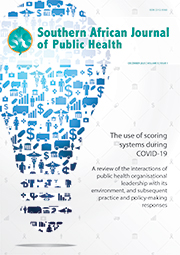Research

Acceptance and choices of family planning methods of postdelivery women in a midwife obstetric unit in South Africa
Abstract
Background. The benefit of utilising reliable family planning (FP) is adequate birth spacing, reducing unplanned and unwanted
pregnancies, and minimising the chances of preterm birth and babies of low birthweight.
Objectives. To estimate the choices and acceptance rates of FP methods among HIV-positive women immediately after delivery, and the factors associated with acceptance.
Methods. A retrospective descriptive research design was implemented. All women who gave birth in a midwife obstetric unit (MOU) during January 2018 to December 2019 were included. Logistic regression analysis was performed to identify predictors for acceptance of any and or double FP methods.
Results. A total of 1 442 women were included, and of these, the majority (93.4%) accepted any FP method. Double methods were accepted by 83% of women. The majority (84%) accepted injectable contraception. Only 7.1% accepted and inserted sub-dermal implants, and 7.2% intrauterine contraceptive devices. Women who did not initiate antenatal care (ANC) during pregnancy were 65% (odds ratio
(OR) 0.35, 95% confidence interval (CI) 0.15 - 0.78, p=0.011) less likely to accept any FP method compared with those who had >8 ANC visits. HIV-positive women with gestational age (GA) at delivery <32 weeks, were 81% (OR 0.19, 95% CI 0.08 - 0.45, p<0.001) were less likely to accept any FP method compared with those who delivered at term, and with GA at delivery 33 - 36 weeks the proportion was 48% (OR
0.52, 95% CI; 0.29 - 0.94, p=0.03) Similarly, HIV-positive women who had had stillbirths were 68% (OR=0.32, 95% CI 0.15 - 0.65, p=0.002) less
likely to accept any FP method compared with those who had live births. Mothers who did not have ANC visits were 65% (OR=0.35, 95% CI; 0.16 - 076, p=0.008) and mothers who had HIV infection were 37% (OR=0.63, 95% CI; 0.42 - 0.93, p=0.022) less likely to accept double FP methods compared with those who had >8 ANC visits and were not infected with HIV, respectively.
Conclusion. Overall, high acceptance of FP was found among postpartum women. ANC, GA at delivery and having live births were significantly associated with acceptance of any FP and double FP methods of protection. Further prospective study is recommended to identify whether the acceptance of FP services in the postpartum period continues at such a high rate.
Authors' affiliations
A M Hoque, Kwadabeka Community Health Centre, Department of Health, Durban, South Africa
S Buckus, Kwadabeka Community Health Centre, Department of Health, Durban, South Africa
M Hoque, South African College of Applied Psychology, Durban, South Africa
Full Text
Cite this article
Article History
Date published: 2022-10-28
Article Views
Full text views: 1288

.jpg)


Comments on this article
*Read our policy for posting comments here